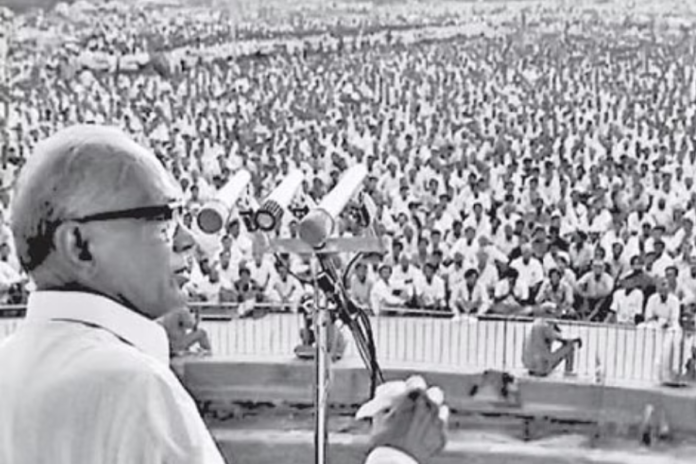Jayaprakash Narayan, fondly remembered as JP or ‘Lok Nayak’ by a sizeable chunk of the Indian public, was a dissenter extraordinaire and a political movement unto himself. He was, in retrospect, the most divisive politician that independent India has ever produced. His movement touched every corner of the nation and rocked its conscience and imagination, especially during the turbulent 1970s. Interesting enough, all the smoke and fire his life had set off had been motivated by issues that would change how people thought about India.
That brings up the most crucial issue: Who is this man? The subject has been debated since JP’s passing in 1979, but no one academic or historian has been able to provide a thorough response simply because JP’s complex existence violated accepted notions of what a political human being ought to be.
A few works, such as In the Name of Democracy: JP Movement and the Emergency by Bipan Chandra, attempted to provide a glimpse into JP’s mysterious but transparent life. However, a thorough work on JP has long been desired, and Bimal Prasad and Sujata Prasad’s The Dream of Revolution satisfies that demand.
Fight against Emergency
Bimal Prasad, a historian and diplomat, taught South Asian Studies at JNU in Delhi.
Bimal Prasad, JP’s close friend and confidant, followed JP’s life and profession, particularly in the years before his arrest and imprisonment during the Emergency. After trying this biography, he died in 2015. However, Sujata, the daughter of Bimal Prasad, was able to complete the task, and the end result is this stunning book on the Jayaprakash Narayan movement that is based on extensive research.
JP Narayan: Rebel with a cause
The very direct vision statement that opens The Dream of Revolution is striking. “Jayaprakash Narayan needs to be rescued from the condescension of posterity and a curious historical amnesia,” writes Sujata Prasad in her endearing introduction.
As one reads through the book, it becomes clear that the statement is accurately represented in this compact, well-edited booklet. Bimal and Sujata Prasad profile a man who, at one point in history, was as well-known as Mahatma Gandhi in brief, temperate writing.
Although his revolution didn’t go as planned, JP was a revolutionary. It did crumble, and the movement split and dispersed into numerous channels. Having said that, JP wasn’t a success either. He continues to be one of the most significant corrective forces in Indian politics in recent memory.
Even though the hue and nature of the slogans JP coined—against nepotism, elitism, exclusionary politics, authoritarianism, and in support of people’s democracy, socialism, participatory rule, and social audit of politics—have undergone unrecognisable transformations, they still resonate in Indian politics today. Simply put, a piece of JP can be found in any politician today, regardless of party.
In the truest meaning of the word, JP was a renegade. He defied customs and challenged power without fear. He was constantly seeking for new ideas and customs, which led him to vehemently contest the existing quo. This characteristic made him an opponent of nearly all political parties in India, and in the 1960s, he had the uncommon distinction of being a political figure who both Congressmen and Communists detested.
Champion of democratic rights
He shared Mahatma Gandhi’s passion for the idea of an egalitarian society in India. But JP went over and beyond to embrace socialism, unlike Gandhi.
The Dream of Revolution describes in impassioned detail how JP was influenced by Gandhian nonviolence, European enlightenment principles, Marxist beliefs in particular and socialism in general.
“I was trying to widen the horizons of democracy,” JP wrote in his Prison Diary.
However, he saw firsthand how authoritarianism might damage democratic values and the freedom of speech during the Emergency, and he remained a supporter of liberty and popular rule until the end of his life. He was a citizen’s man.
The book’s gorgeous, lyrical style is one of its most remarkable aspects. Such simplicity, sweetness, and clarity are now uncommon in non-fiction writing. Anyone interested in India should read this book since the tale of Lok Nayak Jayaprakash Narayan would be lacking without it.



